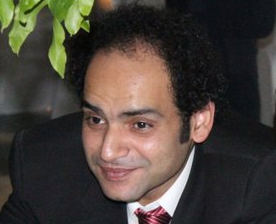
The one year anniversary of Mohamed Morsi’s election is approaching fast. From a substitute candidate to a very controversial president; Morsi remains one of the revolution’s big surprises. During the 18 days back at the square, we had a strange sense of certainty that there could be no president from the Muslim Brotherhood. I even remember some of us were sure that the Islamists would never add up to a majority in the parliament. When you think about it, Morsi and his fellow Islamists are the perfect example of the frustration we felt after the revolution.
The closer 30 June approaches, the more polarised Egypt becomes. Those who support Morsi are starting to show violent sentiments, and sometimes make direct threats to those who are against him or who plan to protest against Morsi’s rule on 30 June. On the other hand, a significant number of the ones who plan to demonstrate against Morsi are starting to show signs of relentless persistence. Between these two poles lie a number of categories, insignificant in number and/or influence.
The growing tension between the two poles is a dangerous sign which points to the possibility of violence erupting. On the one hand, clashes between protesters and security forces will take place as usual. On the other hand, it is very likely that violent confrontations between citizens will take place. Therefore, it would be really silly to expect objectivity in the middle of all this fanaticism.
All the pro-Morsi people I have met have all asked me the same question, what did Morsi do? Then they ask you, don’t you know the amount of pressure the man has to work under? And some of them would pass questioning and go straight to making statements like “you only hate him because he is a good Muslim” or “all of this is because the west does not want Islam to prevail.”
Well, this is an honest and objective attempt to list the reasons why I believe, and many others like me do, that Morsi has done more harm than good. This has nothing to do with the man being a good Muslim or a member of the Muslim Brotherhood. Morsi was in a position to implement much needed change; yet, he instead issued a series of strange decisions that made his presidency closer to an experimental one. This is an objective account of the decisions Morsi took and the negative consequences those decisions had.
Morsi officially took office on 24 June 2012. A few days later, on 8 July, Morsi made his first decision, cancelling the Constitutional Court’s ruling to dissolve parliament, and calling parliament back based on his presidential decree. Two days later, Morsi changed his mind and decided not to challenge the court, backing down from reconvening parliament after the court dissolved it again. The very first decree Morsi made was one intended to overturn a court’s ruling. From the beginning of his term, Morsi has shown clear signs of vulgar abuse of power.
A few months later, Morsi started this unconstitutional power-hungry raid on the judiciary. The issue of the public prosecutor, whom Morsi decided to relieve from duty and appoint as an ambassador to Vatican City, marked the beginning of a new phase in Morsi’s rule. It was not necessarily the beginning of an authoritarian regime under the banner of the brotherhood (that will come later), but it was certainly the beginning of a clear diversion from any plausibly democratic path, especially the one promised by Morsi in his presidential campaign.
Shortly after this decision was made, Morsi surprised us all in November with a new constitutional declaration; one which was an obvious attempt to make sure Muslim Brotherhood core interests would be served. In this declaration, Morsi made his decisions immune from judicial review, appointed a new public prosecutor and made the Shura Council and the Constitutional Assembly immune as well. This phase indeed marked the beginning of the disclosure of the Muslim Brotherhood’s expansive plans.
Unfortunately, space constraints will not enable me to list all the decisions made over the past year. However, what is mentioned above is not an opinion or a conspiracy theory; it is simply an incomplete recount of Morsi’s performance.
I would oppose any president who diverts this country away from democracy as much as Morsi has. He is not a symbol of Islam or an example of virtue or a watchful guardian over Egyptian interests. Opposing him is not opposing Islam, neither is it an attempt to spread immorality. Those who dreamed of democracy and who took to the streets in search of dignity, freedom and social justice must oppose Morsi for failing to deliver these things
Maybe what we need is a moment of objective thinking before we allow fanaticism to take over.



